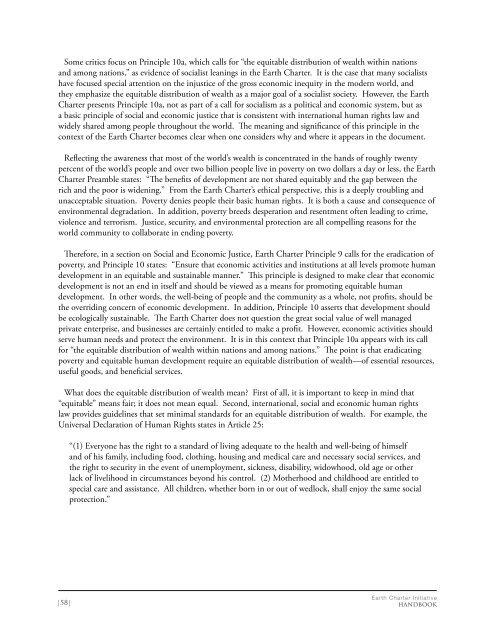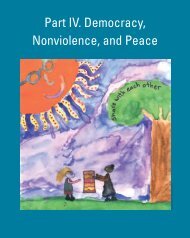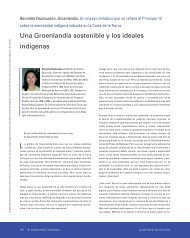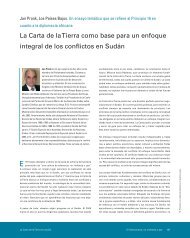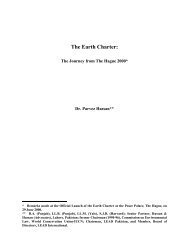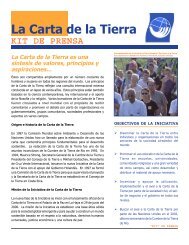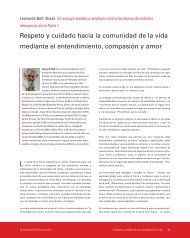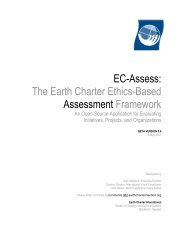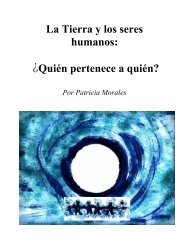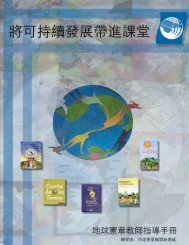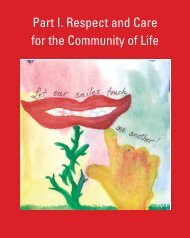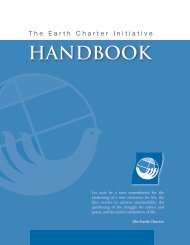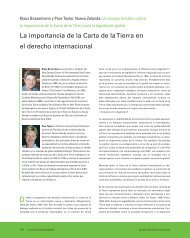Handbook English - Earth Charter Initiative
Handbook English - Earth Charter Initiative
Handbook English - Earth Charter Initiative
You also want an ePaper? Increase the reach of your titles
YUMPU automatically turns print PDFs into web optimized ePapers that Google loves.
Some critics focus on Principle 10a, which calls for “the equitable distribution of wealth within nations<br />
and among nations,” as evidence of socialist leanings in the <strong>Earth</strong> <strong>Charter</strong>. It is the case that many socialists<br />
have focused special attention on the injustice of the gross economic inequity in the modern world, and<br />
they emphasize the equitable distribution of wealth as a major goal of a socialist society. However, the <strong>Earth</strong><br />
<strong>Charter</strong> presents Principle 10a, not as part of a call for socialism as a political and economic system, but as<br />
a basic principle of social and economic justice that is consistent with international human rights law and<br />
widely shared among people throughout the world. The meaning and significance of this principle in the<br />
context of the <strong>Earth</strong> <strong>Charter</strong> becomes clear when one considers why and where it appears in the document.<br />
Reflecting the awareness that most of the world’s wealth is concentrated in the hands of roughly twenty<br />
percent of the world’s people and over two billion people live in poverty on two dollars a day or less, the <strong>Earth</strong><br />
<strong>Charter</strong> Preamble states: “The benefits of development are not shared equitably and the gap between the<br />
rich and the poor is widening.” From the <strong>Earth</strong> <strong>Charter</strong>’s ethical perspective, this is a deeply troubling and<br />
unacceptable situation. Poverty denies people their basic human rights. It is both a cause and consequence of<br />
environmental degradation. In addition, poverty breeds desperation and resentment often leading to crime,<br />
violence and terrorism. Justice, security, and environmental protection are all compelling reasons for the<br />
world community to collaborate in ending poverty.<br />
Therefore, in a section on Social and Economic Justice, <strong>Earth</strong> <strong>Charter</strong> Principle 9 calls for the eradication of<br />
poverty, and Principle 10 states: “Ensure that economic activities and institutions at all levels promote human<br />
development in an equitable and sustainable manner.” This principle is designed to make clear that economic<br />
development is not an end in itself and should be viewed as a means for promoting equitable human<br />
development. In other words, the well-being of people and the community as a whole, not profits, should be<br />
the overriding concern of economic development. In addition, Principle 10 asserts that development should<br />
be ecologically sustainable. The <strong>Earth</strong> <strong>Charter</strong> does not question the great social value of well managed<br />
private enterprise, and businesses are certainly entitled to make a profit. However, economic activities should<br />
serve human needs and protect the environment. It is in this context that Principle 10a appears with its call<br />
for “the equitable distribution of wealth within nations and among nations.” The point is that eradicating<br />
poverty and equitable human development require an equitable distribution of wealth—of essential resources,<br />
useful goods, and beneficial services.<br />
What does the equitable distribution of wealth mean First of all, it is important to keep in mind that<br />
“equitable” means fair; it does not mean equal. Second, international, social and economic human rights<br />
law provides guidelines that set minimal standards for an equitable distribution of wealth. For example, the<br />
Universal Declaration of Human Rights states in Article 25:<br />
“(1) Everyone has the right to a standard of living adequate to the health and well-being of himself<br />
and of his family, including food, clothing, housing and medical care and necessary social services, and<br />
the right to security in the event of unemployment, sickness, disability, widowhood, old age or other<br />
lack of livelihood in circumstances beyond his control. (2) Motherhood and childhood are entitled to<br />
special care and assistance. All children, whether born in or out of wedlock, shall enjoy the same social<br />
protection.”<br />
|58|<br />
<strong>Earth</strong> <strong>Charter</strong> <strong>Initiative</strong><br />
HANDBOOK


